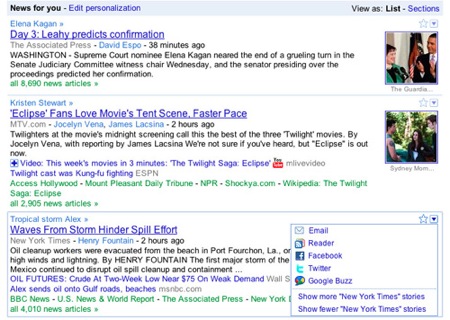
A few moments ago, the Google News homepage rolled out a redesign — a revamp meant to make the algorithm-driven news site “more customizable and shareable.”
“There’s an old saying that all news is local,” writes Google software engineer Kevin Stolt in a blog post announcing the design changes. “But all news is personal too — we connect with it in different ways depending on our interests, where we live, what we do and a lot of other factors. Today we’re revamping the Google News homepage with several changes designed to make the news that you see more relevant to you. We’re also trying to better highlight interesting stories you didn’t know existed and to make it easier for you to share stories through social networks.”
In other words, the new site is trying to balance two major, and often conflicting, goals of news consumption: personalization and serendipity.
![]() The more specific purpose of today’s changes, Google says, is threefold: first, to have consumers tell Google what stories most interest them; second, to help those consumers keep track of ongoing stories; and third, to help them share stories with others.
The more specific purpose of today’s changes, Google says, is threefold: first, to have consumers tell Google what stories most interest them; second, to help those consumers keep track of ongoing stories; and third, to help them share stories with others.
Among the changes being implemented, per Stolt’s explanation of them:
Customizable interest areas: “The new heart of the homepage is something we call ‘News for you’: a stream of headlines automatically tailored to your interests. You can help us get it right by using the ‘Edit personalization’ box to specify how much you’re interested in Business, Health, Entertainment, Sports or any subject you want to add (whether it’s the Supreme Court, the World Cup or synthetic biology). You can choose to view the stories by Section view or List view, and reveal more headlines by hovering over the headline with your mouse. We’ll remember your preferences each time you log in.”
Customizable news sourcing: “To give you more control over the news that you see, we’re now allowing you to choose which news sources you’d like to see more or less often. You can do so in News Settings. These sources will rank higher or lower for you (but not for anyone else) in Google News search results and story clusters.”
An emphasis on local news: “And then there’s local news; we’re now highlighting weather and headlines about your city or neighborhood in their own section, which you can edit with whichever location you want to follow.”
An increased emphasis on the Spotlight section: “We’re also more prominently displaying the Spotlight section, which features stories of more lasting interest than breaking news and has been one of our most popular sections since we introduced it last fall.”
Communal (read: non-customized) story highlights: “There are the subjects that interest you and then there’s the major news of the day. To make it easy for you to find the big stories like Hurricane Alex, we’re adding links to topics that many outlets are covering. You’ll find these topics in the Top Stories section on the left side of the homepage as well as in linked keywords above headlines. Clicking on a topic link takes you to a list of related coverage that you can add to your news stream.”
(This is also a nod, I’d add, toward serendipity — a goal Google News has expressed interest in before, most notably through its Spotlight and its Editors’ Picks features.)
The changes are pretty fascinating, all in all (especially in the context of Google’s rumored move into Facebook territory); we’ll likely have more to say on them later on. In the meantime, here’s more on the changes, from the horse’s mouth: